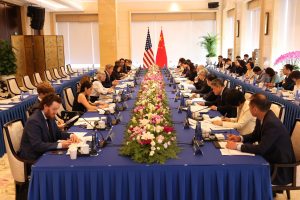U.S. Special Presidential Envoy for Climate John Kerry concluded his trip to China on July 19. It was his third such visit overall and his first since September 2021. While in Beijing, Kerry met with his Chinese counterpart, Xie Zhenhua, as well as with Premier Li Qiang and Wang Yi, the director of the Chinese Communist Party’s Central Foreign Affairs Office.
According to a pre-trip press release from the U.S. State Department, Kerry’s trip was meant to “engage with the PRC on addressing the climate crisis, including with respect to increasing implementation and ambition and promoting a successful COP28” (the PRC is an acronym for the country’s official name, the People’s Republic of China). It was a suitably modest goal, given that China-U.S. relations are only slowly working their way out of a deep freeze.
Indeed, there was no joint statement issued after Kerry’s visit, nor any concrete deliverables. The official read-outs captured a very general level of engagement, with each side stating their broad positions. In the meeting between Kerry and Li, for instance, Kerry “underscor[ed] how important it is for the PRC to take additional steps to enhance its climate ambition in order to avoid the worst impacts of the climate crisis.” Li, meanwhile, told Kerry that the ball is in the United States’ court: “Developed countries should take the lead in reducing emissions and fulfill their financial commitments as soon as possible, while developing countries should make contributions within their capabilities.”
The bigger question underlying Kerry’s visit was whether climate change could be somehow isolated from the broader tensions overshadowing the relationship. The answer seems to be no.
There’s a reason Kerry’s latest visit to China followed trips by Secretary of State Antony Blinken and Secretary of the Treasury Janet Yellen – this climate dialogue was made possible by an overall thaw in relations, rather than existing separately from the foreign policy and economic tracks. While Kerry’s early visits to China in 2021 suggested that climate cooperation could advance despite other setbacks in the relationship, those days seem to be over.
Wang Yi said as much during Kerry’s previous visit to China in September 2021, when he famously compared climate cooperation to an “oasis” that could not continue to exist if China-U.S. relations continued to be “desertified.” Wang made a similar point in talks with Kerry this week, saying that “China-U.S. climate change cooperation has enormous potential, but that the same time it cannot be separated from the understanding and support of the peoples of the two countries, nor from the greater environment of China-U.S. relations.”
As recently as March 2022, Beijing seemed to be considering handling climate issues on a separate track. China’s then-ambassador to the United States (and now its foreign minister), Qin Gang, told a forum focused on energy innovation that China wanted to “inject more positive energy” into China-U.S. relations, and “cooperation on climate just provides such positive energy.”
Qin outlined a view of climate change that looks very similar to Kerry’s: It’s not only an area of pressing global need, where China and the U.S. share much common ground, but also a way to “overcome challenges and create opportunities” in the bilateral relationship. In this framing, climate change cooperation could be the catalyst for improving the overall China-U.S. relationship, rather than falling victim to “desertification.”
But ultimately, China seems to have rejected the idea of pursuing concrete progress with the U.S. on climate issues while the relationship remains generally tense in other areas. After noting that China-U.S. climate cooperation cannot be divorced from other issues, Wang effectively provided Kerry with China’s conditions for such engagement: Beijing “hopes that the U.S. side will pursue a rational, pragmatic, and positive China policy; continue to hold fast to the one China principle and properly handle the Taiwan issue; and walk along with China on the path of mutual respect, peaceful coexistence, and win-win cooperation.”
There’s some irony to this dynamic, as China frequently advocates for certain issues – say, its border dispute with India, or its maritime disputes with Southeast Asian countries in the South China Sea – to be carved out from bilateral relationships and handled separately, so as not to impede cooperation in other areas. In the U.S. case, however, Beijing is one insisting that no single issue – even one as critical as climate change – can be separated from the broader bilateral relationship.
That said, there is hope coming from a different front. Instead of meeting with Kerry, China’s top leader, Xi Jinping, chose to deliver his climate message at a national conference on ecological and environmental protection, held at the same time Kerry was in Beijing. In his remarks, Xi openly acknowledged that China has more work to do on environmental issues. He also struck a sense of urgency, telling the audience that “the coming five years will be critical to the building of a beautiful China.”
But it’s equally clear that Xi wants China’s actions on climate change and environmental protection to be viewed as self-driven, rather than motivated by U.S. pressure. “China’s pathways, methods, pace, and intensity of work to reach carbon goals should and must be determined by the country itself, and be free from outside interference,” he said. That casts a dim light on the prospects from China-U.S. climate cooperation – even as Beijing continues to move forward on its own on emissions reductions and environmental protection.

































